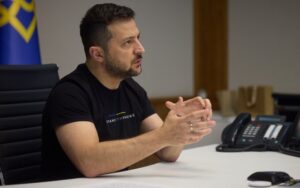
Ukraine needs to strengthen protection of energy facilities before the next heating season and carry out work to decentralize the energy sector, Ukrainian President Volodymyr Zelensky said in a video address on Sunday.
“We are working through all scenarios and will do everything to approach the next winter ready for any threat. In six months, our power engineers, officials, the security and defense sector and everyone involved in the relevant tasks must do absolutely specific things,” he said.
According to the president, it is necessary “to strengthen the protection of power facilities, to restore the infrastructure that has been destroyed by Russian strikes in the past six months, to give more opportunities to our people under the power system decentralization project, so that people can generate and supply electricity on their private territory, on their private facilities. This is a big job; it has already begun.

The official presentation of the project “Governance and Local Accountability (Hoverla) Activity” with a budget of $74 million, funded by the United States Agency for International Development (USAID), took place in Kyiv.
“After the successful local elections in 2020, when Ukrainians elected representatives of their newly united regions and communities, now is the time to start a new phase in decentralization. Decentralization reform can ensure that all levels of Ukraine’s leadership represent the best modern democratic practices,” U.S. Charge d’Affaires in Ukraine Kristina Kvien said at the project presentation in Kyiv on Monday.
She said that one of the key next steps in decentralization is to adopt an amendment to the Ukrainian Constitution. “This is a long debated step and I encourage you all to work together to complete it,” Kvien said.
In turn, Prime Minister Denys Shmyhal confirmed that for the irreversibility of the reform, it is important to introduce and consolidate in the Constitution of Ukraine the appropriate changes regarding a new model of local government, the territorial organization of power, built on the principles of decentralization and subsidiarity.
“Regarding the government’s action program in decentralization, I want to say that in order to complete the reform, the government is introducing a number of important measures to decentralize power and reform local government. Relevant bills for their implementation are already being developed,” he said.
According to the head of government, we are talking about the delineation of powers and the creation of appropriate material financial conditions for their implementation, reformatting local government administrations into prefectural-type agencies, improving the forms of inter-municipal cooperation as an effective mechanism for cooperation of territorial communities, introducing a new municipal service, improving the forms of attracting residents to making managerial decisions and determining the procedure for resolving issues of the administrative territorial structure.
“The government focuses on strengthening the institutional and financial capacity of communities and their development,” Shmyhal said. The prime minister said the pilot areas of the project have already been selected, Volyn, Lviv, Poltava, and also add there is a need to expand the geography of the project to other regions and other communities.
Chief of the Hoverla project Gabriel Abraham said the project has already identified the first 25 partner communities from Lviv, Poltava and Volyn regions.
“During the implementation of the project, Hoverla plans to use replicable models and mechanisms to increase support for two more communities with the involvement of partners, associations of local government, other civil society actors and government agencies,” he said.
Abraham said the project is designed for five years, until 2026. “The activities of Hoverla are based on three principal goals. The first goal is to support policies and laws. The second goal is to support local officials. The third goal is to support the interaction of citizens with their officials,” the project manager said.

Decentralization in Ukraine is far from completion, considers the local government expert, director of the Practical Policy Program of the Institute of Political Education, Alexander Solontay.
“Today we are far from having a decentralized country, we have done only the first basic steps, but we are moving towards this”, – Solontay claimed in comments on features and problems of the decentralization process in Ukraine
on the Youtube channel “Club of Experts“.

In the expert’s opinion, now has arisen a situation in which the implemented reforms had led to greater autonomy of urban and rural communities. At the national level, however, politicians are chosen by a paternalistic population. These policies support communities’ autonomy on the one hand and, on the other, want the Centre to continue to provide guidance locally.
“From above, the mechanisms for interaction with autonomous communities have not yet been worked out. The politicians act in the old way – to pass laws, to direct an order, to allocate funds, and so on. It’s vertical management. How to manage in a new system, where the bottom is independent and the top has limited possibilities, authorities have not yet learned», – says the expert.
Solontay noted that in our environment, where the shadow economy and corruption have not been overcome, the law enforcement agencies are under-reformed and the local power is increasingly independent, a systemic crisis has arisen in interaction of Center and regions.
«Whatever situation would appear in the country, we are always condemned to conflict between authorities and local self-government», – the expert summarized.
DECENTRALIZATION, EXPERT, EXPERTSCLUB, POLITICS, SELF-GOVERNMENT, SOLONTAY

The European Union (EU) continues the U-LEAD with Europe: Ukraine local empowerment, accountability and development programme and would provide EUR 50 million for the implementation of the second phase of the programme. The press service of Deputy Prime Minister, Regional Development, Construction, Housing and Utilities Economy Minister Hennadiy Zubko has reported that this was discussed at a meeting of the deputy prime minister with Head of the Support Group for Ukraine in the European Commission Peter Wagner and Head of Cooperation at the EU Delegation to Ukraine Stefan Schleuning.
“We continue successful cooperation with the U-LEAD project. The road map of cooperation will remain the same, since Ukraine’s agreement with the EU on cooperation under this project complies with the European Charter of Local Self-Government. By the end of January 2019, together with our international partners, we will prepare action plan 2020 and on its basis we will propose the structure of the Central Reform Office. We have many new tasks, in particular, work on electoral legislation and cartographic works for modeling the processes in the regions,” Zubko said.
According to him, now the country, in particular, the central and local authorities, the parliament, and local authorities, faces a number of tasks, the implementation of which will lead to the successful implementation of the decentralization reform. This is the creation of a new territorial base and the holding of elections in 2020 on the new administrative and territorial map of Ukraine.
The deputy prime minister said that synchronously, local governments, regional administrations and more than 10 ministries should advance in the creation of the sub-regional level and their own territorial structures.
“In 2020, the issue of the new electoral legislation on local elections will appear. And we will propose changes to the legislation. We will insist on involving the public in the electoral process. Time is short – two years. This is very little for these tectonic changes. However, we have strong support from international partners,” Zubko said.